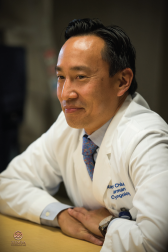Holiday break is a good time to Netflix. The movie “Good Will Hunting” is an old standby and has one of my favorite lines. When the psychiatrist played by Robin Williams asks the troubled but brilliant character played by Matt Damon which books are good to read, he responds, “Hey, whatever blows your hair back.”
Explore This Issue
February 2020It got me thinking: What blows my “intellectual” hair back? I could certainly write about my favorite golf course architect, but I’m pretty sure even my wife and parents wouldn’t bother reading the article. I figured I would write about a medical conference I recently attended that falls outside the traditional otolaryngology space. This conference definitely blew my hair back, and its content may reshape the future of medicine.
AIMed is a meeting of data scientists, physicians, healthcare executives, technology vendors, and philosophers. The artificial intelligence in medicine market is projected to reach $6 billion by 2021, and 80% of healthcare executives are increasing their investments in artificial intelligence, according to the consulting conglomerate Medical Intelligence 10. A modern-day example is a health system that employs data scientists and informatics specialists to devise machine-learning algorithms that can risk-adjust patient populations prone for hospital readmissions and complications.
 Google, IBM, Microsoft, and Amazon are all in, and the space is so much more than just robots. Nearly all of us are familiar with Siri and Alexa. It will not be long before a medical version will be available. A recent Boston Children’s Hospital pilot showed how post-operative CT patients could ask questions and receive answers from a medical natural language processing platform. Microsoft is partnered with a company called Nuance to accelerate the delivery of ambient clinical intelligence technologies to serve as a virtual scribe in the clinic exam room. There will be a day in the near future when the program will interpret the words being spoken in the room while a physician sees a patient and will construct a note, begin to order tests, and work on the logistics for future therapy. Imagine what that could do for physician burnout from the EMR! The famous IBM Watson program has grown from defeating grand chess masters to diagnosing a patient’s breast adenocarcinoma from her mammogram and patterns of text from her history of present illness. Closer to home, a group from MIT demonstrated a model that automatically learns features predictive of vocal cord disorders, and head and neck cancer researchers are using machine-learning algorithms to predict regional and distant metastases.
Google, IBM, Microsoft, and Amazon are all in, and the space is so much more than just robots. Nearly all of us are familiar with Siri and Alexa. It will not be long before a medical version will be available. A recent Boston Children’s Hospital pilot showed how post-operative CT patients could ask questions and receive answers from a medical natural language processing platform. Microsoft is partnered with a company called Nuance to accelerate the delivery of ambient clinical intelligence technologies to serve as a virtual scribe in the clinic exam room. There will be a day in the near future when the program will interpret the words being spoken in the room while a physician sees a patient and will construct a note, begin to order tests, and work on the logistics for future therapy. Imagine what that could do for physician burnout from the EMR! The famous IBM Watson program has grown from defeating grand chess masters to diagnosing a patient’s breast adenocarcinoma from her mammogram and patterns of text from her history of present illness. Closer to home, a group from MIT demonstrated a model that automatically learns features predictive of vocal cord disorders, and head and neck cancer researchers are using machine-learning algorithms to predict regional and distant metastases.
Along with the explosion of technology are very real ethical concerns. Does machine learning take into consideration the natural course of disease, and can it render a holistic provision of care? Does the public truly benefit, and is it safe to rely on a computer process that may be accurate only 90% of the time? Will artificial intelligence be federally regulated to keep patients safe? How do we vet its applications so that harm is not done for the sake of expediency and efficiency? And what does this do to patients who are not technologically adept or those who don’t have the means to use these devices?
I find this to all be truly fascinating and thought provoking. Getting your hair blown back every now and then is a good thing, and it often takes a trip outside of the world we live in to experience something novel and innovative.
Thanks for reading, and I look forward to connecting next month.
—Alex